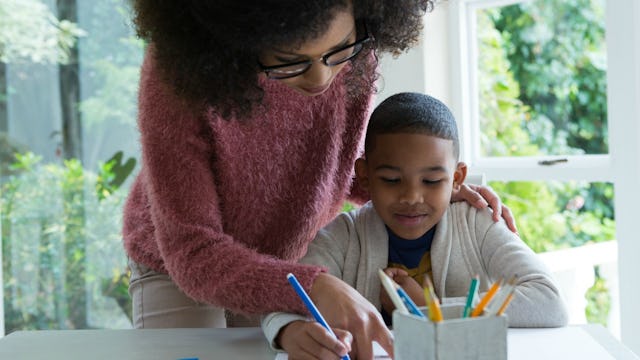I Had To Learn To Like My Kid Again

As moms, we’re not supposed to admit when we don’t like our kids, but it’s true. Sometimes they are uncool. Like, extremely uncool. When our negative interactions with them go from occasional to habitual, we risk the health of the entire relationship with that child.
Lest we forget, our kids are not supposed to be angels. They are mere humans with (usually) our DNA or our last name. And we are just humans raising them. Parents and kids alike, we are all people with bad habits and bad breath, living in the same house.
It’s true, often our personalities don’t match. Or we have children with truly challenging behavior. It can bring a person to a breaking point parenting a child who will not respond to their patience and care, and sometimes parents feel they are simply going through the motions with difficult kids.
What I’ve found to be true about parenting is love is a verb and “like” is a feeling. We can love our kids through our actions, by caring for them and meeting their needs, but we need positive interaction with them to experience the feeling that we like them. This matters because when we don’t feel like we like our kids, it’s harder to convince them we actually love them.
So how do we like kids when they are repeatedly and consistently unlikeable?
A few years ago, I went through a period where days turned into weeks as I felt increasingly disconnected and angry with one of my kids. It turned out the real battle wasn’t with my son. It was with me, and how I felt about myself for being a “bad mom.” His challenging behavior and my negative reactions created a cycle that confirmed to me that I was a bad mom, and I was angry with my son for reminding me of that.
One morning as I sat in bed, I got the courage to question my assumption that I was a bad mom and wondered if there was more to the story. Here are a few things I tried that worked in helping me enjoy my child again:
1. I decided I no longer wanted to tolerate disconnection from my kid.
Sure, we get mad at our kids, but when we start to feel predominantly angry or annoyed, when we struggle to get “I love you” out of our mouths, when we don’t want to give them hugs or affirmation, then something is wrong. Where else are our kids going to get positive feedback and love if not from us? The family is the place where our kids learn whether they are worthy of love or not. Of course, they are, but are they hearing it from us as their parents?
2. I remembered we are on the same team.
We talk about “breaking our kids down” or a “battle of wills,” and I think this way of talking about parenting puts us at odds with our kids. Why are we fighting them again? Winning with our kids looks more like keeping the relationship intact in the end, rather than being the loudest or being right…because we parents can all win that battle, amiright? Instead of making enemies of our kids, we can focus on the behavior and make that the bad guy.
3. I forgave myself.
I recognized that even though I shouldn’t have unreasonable expectations of my son, I did. He was young and guilt told me I should be able to roll with his misbehaviors, but when I didn’t, I felt horrible. It only confirmed what I was already feeling — that I was a terrible mother for overreacting or not liking my child. Feeling guilty only kept me stuck in the same bad behavior, but forgiving myself and giving myself grace to learn how to mother gave me room to start acting differently.
4. Before the feelings came back, I started acting like I liked him.
I started saying “I love you” and being intentionally affectionate with my son, and it changed me. Action goes before feeling, people tell you, but there’s science behind this piece of advice. Research shows that oxytocin, our well-being and bonding hormone, is released during positive interaction, specifically positive touch like hugs, wrestling or tickle fights, and other play. In fact, we need around eight hugs a day to maintain an optimal oxytocin, or well-being, level. If you have kids, eight hugs should be a given, which is awesome.
5. I kept reaching out.
When we’re in a relationship rut with our kids, reaching out and saying “I love you,” putting a kind note in their lunch or tucking them in at night with an extra story might feel almost too hard — do it anyway. If you’ve been crabby or distant for a while, or if you find yourself angry at yourself for how you’re parenting, it may even help to ask your child for forgiveness. This allows them to see that you own your bad behavior and want to make a change too, which is exactly what we want to teach them to do. And if you don’t model it for them, who will?
I don’t believe it’s a luxury to love and like our kids. It’s a necessity. So if you catch yourself not feeling the love, don’t lose hope. You can do something about it, and actually enjoying your kid is worth it.
This article was originally published on